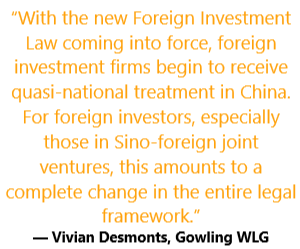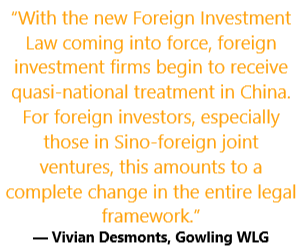
On January 1, 2020, the new Foreign Investment Law (FIL) of the People’s Republic of China and its Implementing Regulations came into force, formally replacing the so-called Three Foreign Investment Laws which has a history of nearly 40 years in China, marking the arrival of a new era of foreign investment. Compared with the old system, the new law has brought changes and breakthroughs to many fields of foreign investment, but it also leaves gaps in the legislation when it comes to some difficult issues.
The legislative history of foreign investment in China can be traced back to 40 years: in 1979, the Law on Sino-Foreign Equity Joint Ventures was implemented, and in the following years, the Law on Foreign-funded Enterprises and the Law on Sino-foreign Cooperative Enterprises were promulgated respectively. Altogether, they constitute the Three Foreign Investment Laws and regulate several matters concerning the entry of foreign investment into China in the past decades.
Speaking of the previous foreign investment laws, Jerry Liu, a partner at Global Law Office’s Shanghai office and a lawyer with more than a decade of experience in foreign direct investment practice, tells Asian Legal Business that the “formulation of these three laws was closely related to China’s reform and opening up in the late 1970s and early 1980s. Take the Law on Sino-Foreign Joint Ventures as an example, when this law and its Implementing Regulations came into effect, China did not even have a complete Company Law. Our legislative principle at that time was to first practice, then promulgate and set up a law.”
 Liu continues: “This means that the laws were very quickly drafted, and they were not very specific. In the subsequent implementation process, we had to patch them up as we go. There were not a lot of provisions in the foreign investment laws, but the whole legal system covered many departmental rules and judicial interpretation, many even in the form of notices. This has led to a certain degree of confusion in foreign investment administration in China over the past 30 years. Foreign investment administration also involved many different regulatory departments: including industry and commerce, commission of commerce, foreign administration, taxation, customs, finance and so on.”
Liu continues: “This means that the laws were very quickly drafted, and they were not very specific. In the subsequent implementation process, we had to patch them up as we go. There were not a lot of provisions in the foreign investment laws, but the whole legal system covered many departmental rules and judicial interpretation, many even in the form of notices. This has led to a certain degree of confusion in foreign investment administration in China over the past 30 years. Foreign investment administration also involved many different regulatory departments: including industry and commerce, commission of commerce, foreign administration, taxation, customs, finance and so on.”
Vivian Desmonts, partner and head of Gowling WLG’s Guangzhou office, points to another issue of the old laws: “Although the relevant laws have been regularly amended, Sino-Foreign Joint-Ventures in China have been governed since 1979 by specific rules, which became archaic on many matters such as corporate governance, deadlocks between shareholders, excessively powerful for chairmen of the board of directors (i.e. the JV’s legal representative), administrative hurdles not applicable to Chinese domestic companies, etc.”
LEVEL PLAYING FIELD
Under such circumstances and after many rounds of discussion and revision, the new FIL and the Implementation Regulations were finalised. The new law grants quasi-national treatment to foreign investors, implements negative list management in the field of investment, and stipulates rules in technology transfer, investment agreements, information reports, intellectual property rights and other issues.
 According to Liu, the new law “plays more of a declarative role, demonstrating China’s attitude towards granting national treatment and corresponding protection to foreign investors”.
According to Liu, the new law “plays more of a declarative role, demonstrating China’s attitude towards granting national treatment and corresponding protection to foreign investors”.
He interprets the formulation and the role of the new law from two aspects.
“The unification of the former three foreign investment laws has restructured the previous administration mode, and it can be said that one of the main purposes of the new law is to update the old system. We can see that the number of provisions of the new FIL is not large, and it only gives the general direction on many issues. The Company Law can be directly applied in the future to specific issues in company management, operation and so on. Another background of the new law is to better welcome the arrival of a new era of foreign investment.”
“After 2018, the momentum of foreign investment in China has weakened. The development of China’s economy depends on the three ‘carriages:’ foreign direct investment, exports and the domestic market. If the first carriage slows down, it will have an impact on the overall economic development. The promulgation of the new law is also to a certain extent a response to this situation.”
“It was high time the FIL be adopted, and national treatment be finally granted to Foreign Invested Enterprises in China. This is one of the most important legal reforms of the legal framework for foreign investors especially those operating under joint ventures,” says Desmonts, summing up the changes brought about by the new law. “Although a few business sectors remain restricted to foreign investors (as included in the negative list), the Implementing Regulations of the FIL published in late December 2019 confirm FIEs shall benefit from equal treatment with domestic companies in respect of government subsidies, government procurement, intellectual property protection, land supply, tax cuts, qualification licensing, development and application of national standards, HR policies, etc.”
IMPACT ON LEGAL WORK
Although considered more as a frame-work statement, there are still some breakthrough provisions in the new law in different areas of foreign investment. And these changes are bound to have an impact on the relevant services law firms provide.
“The FIL brings many major changes,” Desmonts tells ALB. “For example, it now finally allows Chinese individuals to directly become share-holders of existing FIEs. This opens a wealth of new opportunities, especially for employee share ownership of stock purchase plans.”
Liu thinks that there are three main areas where the new FIL would affect the business of law firms.
“The first is the prohibition of forcing foreign investors or foreign-invested enterprises to transfer technology. At the beginning of 2019, the State Council removed this article by amending the administrative regulations, but this time it was escalated in terms of legislation to show potential investors what China’s attitude on the forced transfer of technology is. Many multinational companies, especially high-tech companies, are worried about this when they enter China, and we hope to see foreign investors enter the Chinese market more freely in the future,” he says.
“The second one is the regulation of investment agreement. As an experienced foreign affair lawyer, I have accompanied many clients to sign investment agreements with industrial parks or local governments, in which some preferential policies have been stipulated, but the validity of such agreements has always been a problem,” says Liu. “The new law directly recognises the validity of investment agreements through designated provisions; declares that these agreements, including the terms on the implementation of the promises made to the foreign investors, should be fulfilled to protect the interests of the investors. This part is very practical. In the past, our clients have even litigated and arbi-trated in accordance with the investment agreement, but all of them were settled. In the future, such cases would have a stronger legal basis.”
The third aspect is the increase in business from existing FIEs brought about by the new FIL. “The existing foreign-funded enterprises, mainly Sino-foreign joint ventures, need to amend and adjust their corporate governance model, which is not a simple issue of industrial and commercial exchanges as it involves a new round of negotiation between foreign investors and their domestic partners in joint ventures. This include the renegotiation of shareholder agreements, the interests of minority shareholders, protective clauses and so on, which will produce a considerable amount of additional business.”
GREY AREAS
How will the new law affect the behav-iour of foreign investors? Both Liu and Desmonts tell ALB that their firms have been advising clients on the draft versions of the law since they were published a few years ago. “Many of our foreign clients are concerned about how the FIL will ensure they actually get equal treatment in practice when investing in China, especially in terms of IP protection, prohibition of forced technology transfers, equal rights with Chinese partners and level playing field against Chinese competitors,” says Desmonts.
Liu points out that the legitimacy of natural person shareholder status and the legitimacy of the VIE struc-ture are top concerns of the clients, the former has been clearly clarified in the new law - natural persons of Chinese nationality can become shareholders of foreign-funded enterprises, while the latter is still up in the air. Liu says: “The draft Foreign Investment Law prom-ulgated by the Ministry of Commerce in 2015 tried to clarify this issue, but the new law and its Implementation Regulations ultimately did not provide a straight answer. It is indeed sensitive, not only to existing listed companies, but also to private equity and venture capital funds, which play an important role in China’s economic development. The development of Chinese enterprises, especially the ones involved in high and new technologies, needs these external funds. This may not be a problem that legislators can solve at a certain stage, and its shelving also reflects the wisdom of legislation.”
The blanks in the new FIL is bound to challenge law firms, but Liu also says: “Most of the clients with a VIE structure are mature companies, and their under- standing of the Chinese market is gradu-ally deepening, which in many cases will not constitute an obstacle for them to continue to be optimistic and enter the Chinese market.”
INCREASING WORK
“The implementation of the FIL as from January 2020 will certainly increase the business volume of our law firm as we anticipate not only many renegotiations of JV contracts in the next five years of legal transition period, but also the development of new programs to allow Chinese individuals or employees to participate in FIEs’ shareholding,” Desmonts says of the potential increase in work brought by the new law.
Liu says that as an established law firm serving in the cross-border business field, Global Law Office has a large portion of business in both the outward and inward investment in China. Therefore, “even though there are fewer provisions in the new law and they are quite broad, it still provides a general direction to us and our clients. We are very optimistic about the promulgation and implementation of the new law,” he says.
As for the impact of the new FIL on the business of law firms in 2020, taking into account the COVID-19 pandemic, Liu believes that “the development of the pandemic will certainly have a greater impact on cross-border capital and personnel flow while having some impact on the business of law firms as well. But in general, we are cautiously optimistic that the necessary projects will proceed after the pandemic is over.”
He goes on to say that “the pandemic is a reshuffle of existing businesses, including those online. To a certain extent, it will reshape the landscape of foreign investment. The pandemic will first promote the financing of life science and health care projects, especially the R&D and manufacturing of vaccines; online business will also further increase, which includes not only online shopping but also the services that provide technical support for online shopping, such as artificial intelligence, industrial Internet, consumer Internet and so on.”
To contact the editorial team, please email ALBEditor@thomsonreuters.com.





